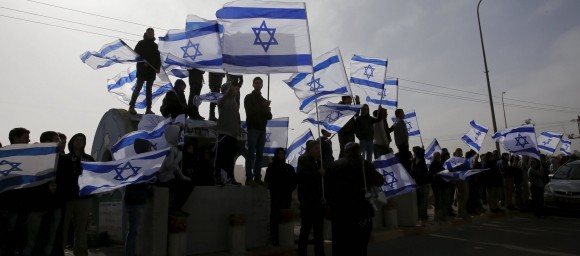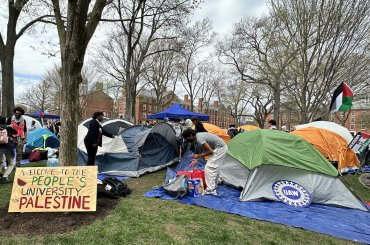“The right to realize self-determination in the State of Israel is unique to the Jewish people”
-the nation state bill, endorsed by ministers in the Netanyahu government
Outside the Zionist State, Zionism is no more than an adaptable world view, an agenda, a particular sect of Judaism, a sui generis birthright, a colonial outpost, an identity, an heirloom, an investment bubble, a federation, priority or organization.
Within the Zionist State, however, it’s a quasi-class that exclusively and permanently owns the means of institutional production. Hence the self-evident proposition — the public institutions of the Zionist State are Zionist. Likewise, the essence of non-Zionism here is the restricted access to all public institutions (political, economic, military, judicial, educational, cultural, etc.).
The non-Zionist caste/class seeks to understand itself as such, take [back] its own spaces, and determine its own needs and agendas. It’s not a question of world views or identity; it’s a social fact arising from the fundamental inequality itself.
Outside, Zionism has a certain malleability of expression that inside it doesn’t have. Here, inside, it has a contrived physical, spatial, structure with physical weaknesses at its core. For example, free human beings can move around, form complex relationships, intermarry and create families, read, learn, think, and otherwise migrate away from the rarefied knowledges that create and recreate the Zionist class. To preempt that sort of class demise, basic freedoms and rights that all people are endowed with have to be curtailed by Zionist-only institutions. Indeed, it becomes almost impossible to organize as a non-Zionist class, thanks to the total monopoly of institutions by the Zionist class. Yet, thankfully, Zionist Space within this state has an intrinsic permeability and vulnerability about it. This essential weakness has to be constantly rendered invisible, lest the non-Zionist class/caste organize itself to counter Zionist Space, creating mass presence and visibility in the otherwise exclusive areas as a means towards civil rights.
These essential weaknesses — the porosity of space and the illegitimacy of “separate but equal” doctrines – cannot, however, be concealed from view. All around, there’s an instinctive understanding that Zionist Space accords with the political preferences of the Zionist class. Thus one is always resisting it in one way or another: sometimes one is trying to push oneself into the Zionist areas, and sometimes one is trying to militantly stay in place and develop separately there.
However, it’s important to fully acknowledge that Zionist Space is not something that can be changed by a sum of individual choices. It can only be changed from within through counter-space. The non-Zionist class/caste requires its own counter-space from which to organize its struggle for self-determination.
On the ground, what we tactically require is an abolishment of Zionist-Only Space, both in its concept and in its practice. We do not need more experts, architects, urban planners for human rights, nongovernmental organizations that “help” Palestinians remain in place in “their villages” who aim to protect the “natural growth” of Palestinian communities, but who work out of structures that are themselves established within Zionist Space, and who don’t confront segregation at their own door. We need networking and organization, so as to rearrange physical space against the preferences of the Zionist quasi-class.
The non-Zionist class/caste can and should be an agent for change. In this the non-Zionist class/caste must draw lessons from discourses elsewhere, for example from pan-African movements in South Africa and elsewhere, where spatial reform is seen as a prerequisite to equal rights, power, and self-determination.
Likewise, the boycott, divestment and sanctions (BDS) campaign is a movement effectively countering the aura of stability and inevitability around Zionist Space. On a practical level, identity with the goals of the global BDS campaign (to end the occupation and colonization of Palestinian land and the Golan Heights, achieve the full equality of Palestinian citizens of Israel, and realize the right of return of Palestinian refugees) cannot but have clear implications inside the Zionist State, where the subjects intuitively grasp that these three basic goals being achieved would spell the end to the Zionist class and its violent hold over public institutions. Inside, there is no room for ambivalence about Zionism, if only because this is a struggle over access. The Zionist classes acutely comprehend that equal civil rights and human rights are radically inconsistent with the concept of Zionist Only Space and a Zionist “demographic balance.” Lacking Zionist Space, there would be no way for the Zionist class to reproduce itself.
There is nothing “natural” about segregation and Zionist demography, and anything which develops “naturally” according to geography develops in accordance with the preferences of the Zionist class, in contradiction to the principle of equal civil rights.



Liberal Zionism is ‘non-Zionism’ now.
Very perceptive. Some discussion of specific Zionist institutions, e.g. JNF, would make the argument less abstract and easier to understand for people who do not know how it works.
As far as I’m concerned, the term “Non-Zionist” is “Non-Sense.”